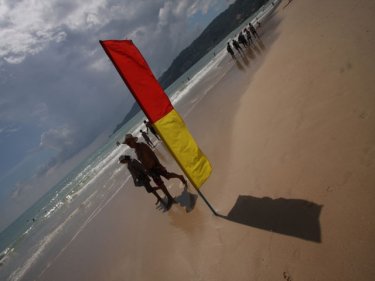Phuket Lifeguard Service manager Prathayut ''Nat'' Cheryon said yesterday that last-minute attempts to reach agreement with the Phuket Provincial Administrative Organisation, which pays the lifeguards, had failed.
Lifeguards packed up and left the beaches yesterday with the most dangerous season of the year, the monsoon season, approaching. In 2012, Phuket's beaches remained unguarded for more than six weeks.
''The budget for the coming year has gone up by 10 percent to 22 million baht but we need new equipment, and the budget doesn't allow us to buy new equipment,'' Khun Nat said.
More than 35 people - most of them tourists - drowned at Phuket's popular beaches or at offshore snorkelling spots last year, the most catastrophic in modern memory. Lifeguards saved hundreds of others.
With increasing numbers of non-swimming Russians and Chinese now arriving on Phuket, the need for skilled lifeguards is greater than ever. However, lifeguards insist they need community help to save more lives - and better equipment.
''All our equipment is three years old and it needs replacing,'' Khun Nat said yesterday. ''The equipment we have falls well short of equipment lifeguards have at holiday destinations in Australia and other places where lifesaver are properly supported.''
Phuket has been urged to implement a triple-warning system for arriving tourists so that everyone knows the dangers of swimming at Karon, Kamala, Kata, Patong, Nai Harn and other beaches on red-flag days when lifeguards struggle to keep all swimmers out of the water.
The problem is that without lifeguards, swimmers will not know whether it's a red-flag day or not. Although some Phuket resorts warn guests on days when it's not safe to swim, the majority do not consider it their responsibility.
Needless drownings may follow the absence of lifeguards, water safety experts fear. If the contractual dispute goes on, the ambassadors of some countries may react by alerting citizens in official travel advisories.
The number of lifeguards is to be cut under the new budget so that the experienced and skilled lifeguards are more adequately rewarded. Instead of having 108 lifeguards on the 13 main beaches, the number would be reduced to 88.
However, in the 22 million baht budget, lifeguards have been advised they will need to spend three million baht renewing obsolete equipment.
''Even if the equipment is ordered tomorrow, it would take weeks to arrive from overseas,'' Khun Nat said.
At destinations where saving lives is a priority, lifesavers are provided with jet-skis and sleds to speed rescues. Phuket's lifeguards have to make do with surfboards.
A plan to provide lifeguards at Racha island, the snorkelling spot where many Chinese tourists die, is on-hold because of the 30,000 baht a month cost.
Despite the income derived from tourism, Phuket authorities appear reluctant to show that Phuket really cares about saving lives rather than meeting budget. A more sensible approach would be to have three-year contracts, or at least overlapping one-year contracts.
Any drownings in the sea off Phuket while the lifeguards are not operating can be expected to seriously damage Phuket's appeal as a year-round beach holiday destination.





A perfectly foreesable situation ignored until the last minute and now this. Life is something considered so cheap on Phuket that no-one is inclined to invest in it. Perhaps the Lifeguards should all block Patong Beach for 10 hours, not let any tourists/ jet skis/ beach vendors etc. on the beach. Will authorities then do something?
Posted by Duncan on April 28, 2014 08:47